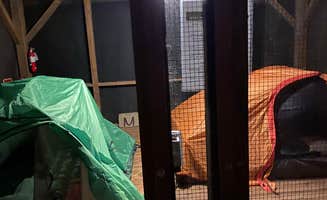Tent camping near Lake Park, Georgia centers primarily around the Suwannee River Wilderness Trail system. Located in the flat coastal plain of southern Georgia and northern Florida, the area sits at elevations typically below 200 feet and features limestone karst topography with numerous springs. Summer temperatures regularly exceed 90°F with high humidity, while winters remain mild with occasional frost.
What to do
Cave diving excursions: At Peacock Slough River Camp, experienced divers can explore the extensive submerged cave system. "The extensive submerged cave system is one of the most beautiful attracting divers from around the world," notes Jeanene A. Springs maintain a consistent 72-degree temperature year-round.
Day trips to regional attractions: The Week's Place offers a strategic base for exploring regional highlights. "From this property, you can day trip to The Little Grand Canyon, the Okefenokee, Tallahassee, FL, Westville, Macon," suggests Ashley F. Most attractions require 1-3 hours of driving.
Spring swimming: Lafayette Blue Springs State Park provides crystal-clear swimming opportunities. "Swimming in crystal clear spring water just steps away," writes Shea A. The limestone bridge at the spring creates a unique snorkeling passage as noted by Aubrey O.: "Beautiful spring for swimming featuring a limestone bridge way you can snorkel under."
Paddle expeditions: Multi-day paddling trips can connect several river camps. "We did a 65 mile paddle on the Suwanee River and stayed at two river camps and a campsite!" writes Caitlin R. Most paddling sections between camps cover 10-12 miles, requiring 4-6 hours of paddling.
What campers like
Screened sleeping pavilions: Woods Ferry River Camp offers elevated sleeping platforms with amenities. "The shelters all have water electricity and benches on the inside. The shelters also have hooks for your hammocks if you prefer to sleep that way," explains Kayla B. Each pavilion typically accommodates 6-8 people.
Free camping access: The river camps remain one of the few no-cost camping networks. "We have been down the Suwannee many times and always stay in woods ferry for FREE!!! Bathhouses electricity potable water shelters!! These are amazing only accessible from the water," writes Kayla B.
Gear transport assistance: Dowling Park River Camp provides equipment to move camping gear from the river. "Wheelbarrows to wheel your stuff from the river to campsite. Amazing!" exclaims Caitlin R. This feature helps campers manage the sometimes lengthy distance between landing areas and campsites.
Electricity at primitive sites: Unlike most backcountry camping, many sites feature electrical access. "Great little park with walk-in tent camping, all sites have power and water which is an awesome bonus!" notes Aubrey O. about Lafayette Blue Springs State Park.
What you should know
Seasonal conditions affect access: River levels can dramatically change landing conditions. "At high water this ramp can be tricky to unload from in a strong current (we have seen it with no beach visible)," warns Jeanene A. about Holton Creek River Camp. Water levels should be checked before trips, especially during rainy seasons.
Wildlife awareness needed: Nocturnal animals frequent the camping areas. "Always take paddles, PFD's, fishing equipment, food items and valuables to your camping area - do not leave in boats. There are raccoons and other nocturnal creatures and an occasional bear passing through," advises Jeanene A.
Insect preparation essential: Bug protection becomes critical during warmer months. "The Suwannee River river camps are spaced a days paddle apart and are wonderfully convenient (especially in summer when afternoon rains come daily and bugs are everywhere)," notes Jeanene A. Campers should pack appropriate repellents and screening.
Spring swimming conditions vary: Water clarity can change based on river conditions. Aubrey O. advises, "If your main purpose for visiting is to swim in the spring make sure to call ahead or go online and check water conditions as this spring is attached to the Suwanee river and can sometimes be 'browned out' due to river levels."
Tips for camping with families
Bathroom facilities: Most river camps include shower access, though quality varies by location. "Clean bathrooms with hot showers. This bathroom was quite clean and a bit bigger than the trailer bathrooms at Dowling Park," writes Caitlin R. about Peacock Slough.
Evening entertainment: Natural soundscapes provide nighttime ambience. "Chuck-will's-widow, owls and frogs will serenade you at night," notes Jeanene A. about Woods Ferry. This creates educational opportunities for children to learn about nocturnal wildlife.
Cooking conveniences: Adams Tract provides various food preparation options. "Bathrooms have showers, grills available, large covered pavilion along with picnic tables and fire pits," writes Jeanene A. The shared facilities allow for more elaborate meals than typical backcountry camping.
Walk-in tent camping: For families not ready for river travel, Lafayette Blue Springs offers accessible tent sites. "Loved this primitive tent camping site. The sites are under the most beautiful live oaks," writes Shea A. This option eliminates the need for water navigation while still providing spring access.
Tips from RVers
Motorcycle camping accommodation: Despite being primarily designed for paddle access, some camps accommodate alternative transport. Earl B. notes at Lafayette Blue Springs: "Rain forced a 3 day stay. Camp host beyond helpful and understanding as we're on a Ural motorcycle. Walk-in with onsite large wheelbarrow no problem."
Insect considerations: Big Camp Hunt Camp presents challenges for vehicle-based campers. "Nice and secluded, great for overlanders. Only downfall is the mosquitos," warns Michael W. RVers should ensure proper screening and repellent.



